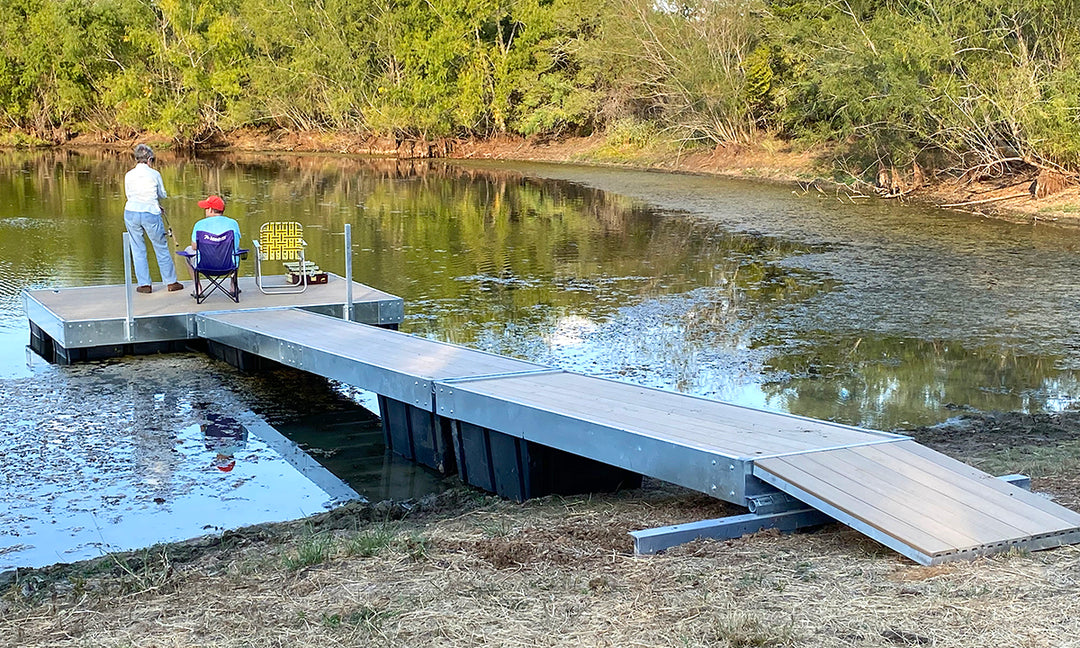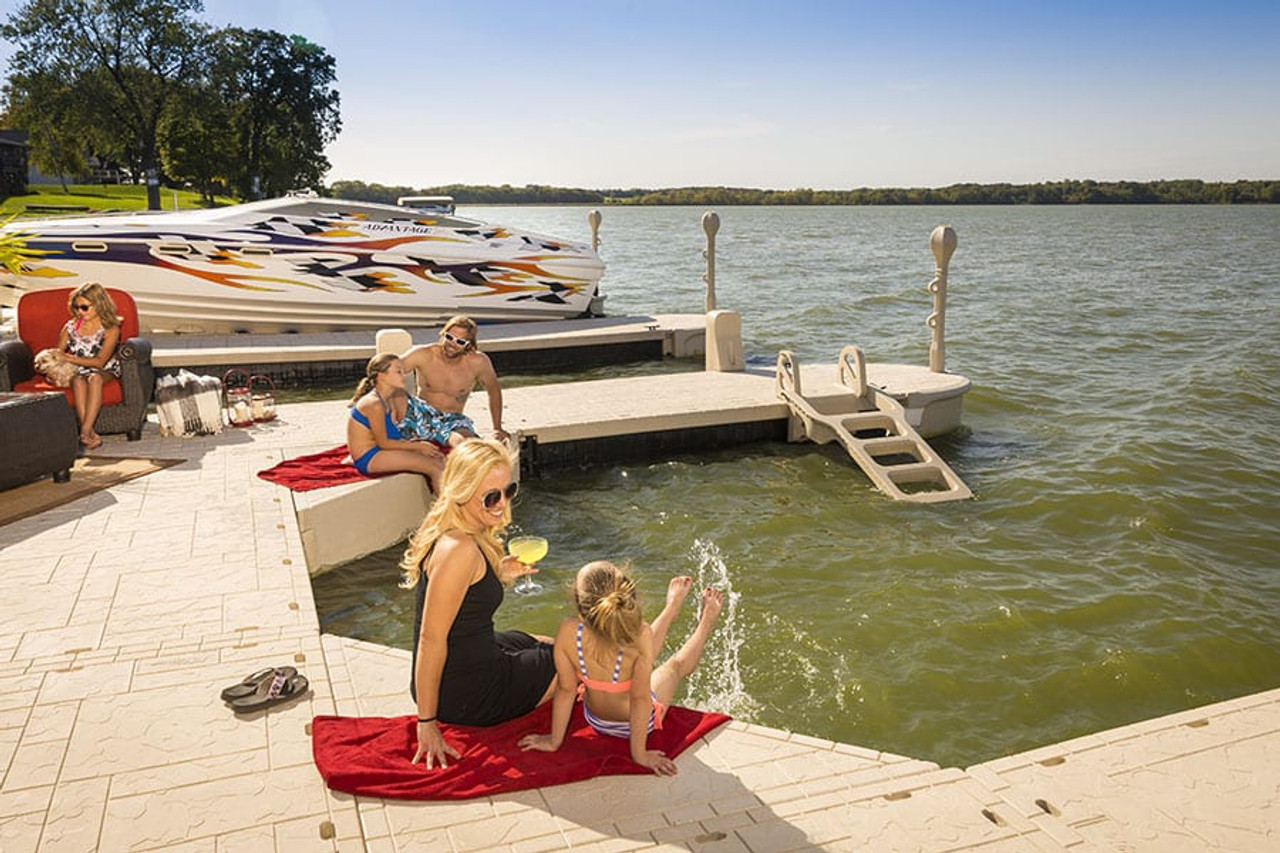Floating Dock Solutions That Transform Your Waterside into a Kicking Back Oasis
Floating Dock Solutions That Transform Your Waterside into a Kicking Back Oasis
Blog Article
The Ultimate Guide to Picking the very best Floating Docks
Selecting the ideal floating dock needs a thorough understanding of numerous elements that influence both performance and durability. Factors such as dock types, products, and crucial attributes dramatically affect your decision-making procedure.
Understanding Floating Dock Types
When selecting a floating dock, it is important to comprehend the numerous kinds readily available, as each offers distinct purposes and applications. Floating docks largely fall under 3 groups: modular, fixed, and pontoon docks.
Modular docks are made up of specific areas that can be conveniently assembled or reconfigured, making them perfect for changing water levels and varied usages, such as commercial operations or recreational tasks. Their adaptability permits for customization based on specific demands.

Pontoon docks are identified by their resilient structure, often made up of numerous pontoons that provide security and support. They are especially well-suited for bigger vessels and are generally used in marinas or for beachfront buildings. Comprehending these types help in selecting one of the most appropriate floating dock to fulfill certain requirements, making sure optimum performance and safety.
Trick Materials for Sturdiness
Selecting the ideal products for floating docks dramatically effects their durability and durability. One of the most typical products consist of timber, plastic, steel, and composite products, each offering distinctive advantages and constraints.
Wood, usually favored for its aesthetic charm, calls for normal maintenance to stand up to dampness and decay. Pressure-treated lumber can enhance resistance to rot, however it might still be at risk to parasites and weathering.

Plastic docks, made of high-density polyethylene (HDPE), are immune to rust, UV radiation, and influence, making them a preferred option for coastal settings. Their lightweight nature also facilitates easy setup and moving.
Steel docks, typically constructed from aluminum or galvanized steel, offer exceptional stamina and sturdiness. They are resistant to corrosion, especially when dealt with, but may need extra insulation to avoid heat buildup in warm climates.
Composite products, integrating wood fibers and plastics, deliver the benefits of both timber and plastic, resisting moisture and fading while calling for very little upkeep. - dock company
Ultimately, the choice of products ought to line up with environmental problems, intended usage, and maintenance preferences to make sure the floating dock continues to be useful and cosmetically pleasing gradually.
Important Functions to Consider
While the choice of materials is important, considering crucial functions for floating docks is similarly vital to ensure optimum efficiency and individual fulfillment. One essential feature to examine is the dock's buoyancy capacity, which establishes just how much weight it can sustain without submerging. floating dock builder. This is vital for suiting boats, individual watercraft, and also recreational tasks
Furthermore, portability is a significant consideration. Depending on your needs, you may want a dock that is simple to disassemble and transfer, especially if you intend to relocate it seasonally. Stability is an additional important function; a well-designed floating dock should minimize motion triggered by wind and water currents, providing a secure platform for users.
Safety and security attributes, such as non-slip surface areas and rounded edges, are also essential to stop accidents, particularly in wet problems. In addition, think about the availability of devices, such as ladders, cleats, and bumpers, which can improve the performance of your dock.
Setup and Maintenance Tips
Establishing up and maintaining a floating dock requires mindful planning and focus to detail click this link to ensure its longevity and ideal efficiency. Begin by picking a proper location that minimizes direct exposure to strong currents and waves, which can trigger wear and tear. Ensure that the water depth is sufficient for the dock's height and that it is anchored safely to avoid activity.
Throughout installation, adhere to the maker's guidelines carefully, as inappropriate setting up can compromise security. Usage high-quality products resistant to deterioration, such as aluminum or treated timber, to boost resilience. On a regular basis inspect all parts, consisting of floats, adapters, and anchoring systems, for signs of damages or wear.
If your dock makes use of flotation tools, guarantee they remain totally free and intact from leaks. By adhering to these installation and maintenance suggestions, you can enjoy a functional and trusted floating dock for years to come.
Budgeting for Your Dock
Budgeting for your dock is a vital action that can substantially affect your general fulfillment and financial investment in a beachfront building. Developing a clear budget assists you browse the various choices available and ensures you make informed choices that align with your monetary capabilities.
Begin by figuring out the dimension and layout of the dock you require, as these variables will greatly influence the expense. Floating docks can vary considerably in cost, depending upon products, buoyancy, and features like devices and ramps. Research study different suppliers and providers to compare costs and comprehend the marketplace worth.
Along with first expenses, think about continuous expenditures such as upkeep, insurance policy, and possible fixings. Designate funds for these persisting costs to stay clear of surprises down the line. It's additionally sensible to budget for any type of essential licenses or evaluations, which may be needed by local policies.
Lastly, keep in mind the potential roi. A well-planned dock can boost your residential or commercial property's worth and allure, giving a positive financial impact in the long-term. By budgeting effectively, you can guarantee that your dock meets your demands without jeopardizing your financial stability.
Verdict
To conclude, picking the excellent floating dock demands a complete evaluation of various variables, including dock types, products, important functions, and installment processes. Focusing on durability and conformity with local guidelines eventually improves performance and residential or commercial property worth. Careful consideration of monetary restraints will better guarantee a sound financial investment. By adhering to these standards, people can make educated choices that advertise lasting satisfaction and usability in water environments.

While the selection of materials is vital, taking into consideration important attributes for floating docks is similarly essential to make certain optimum performance and user contentment.Establishing up and preserving a drifting Resources dock calls for cautious planning and interest to detail to ensure its long life and ideal efficiency. Floating docks can differ substantially in cost, depending on products, buoyancy, and attributes like ramps and accessories.In conclusion, selecting the excellent this post floating dock requires a complete examination of various elements, consisting of dock kinds, materials, crucial features, and installation procedures.
Report this page